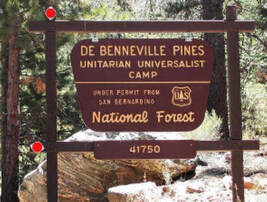 By Pat Gordon, First UU of San Diego Board Member Our UU camp, Camp de Benneville Pines, located in the San Gorgonio wilderness, has been repeatedly hit hard this year and is in trouble. Due to the COVID-19 pandemic, all on-site events are canceled through April 1, 2021.The aftermath of the El Dorado Fire damage and the seriousness of the pandemic could require even further delays before we can consider re-opening. If we're to have a camp to bequeath to our children's children, then preserving what we have now is imperative. We almost lost our camp in the El Dorado Fire, this fire, and had it not been for the work of our staff and volunteers performing fire clearance duties throughout the summer, we would have. And yet, we'll still need more help during the spring and fall to rake pine needles and trim ladder fuels in camp- live or dead vegetation that allows a fire to climb up from the forest floor into the tree canopy. Please continue to send healing thoughts and good words of appreciation to our devoted staff, as they navigate through all the added responsibilities that come with the fire aftermath. We must now address the newest threat to camp's existence - flooding.
1 Comment
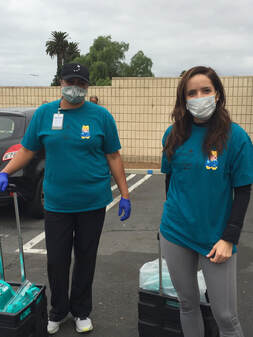 Shirley Koch and Xochitl Cerda from Rady’s Children’s Hospital Health Stars Program. Shirley Koch and Xochitl Cerda from Rady’s Children’s Hospital Health Stars Program. By Maureen McNair Here is a good reason to answer a telephone call from an unknown phone number, even in the weeks leading up the election: it could be actual good news! Shirley Koch works for Rady’s Children’s Hospital in a program called Health Stars. Health Stars provides early literacy intervention for low income and homeless parents with children up to age 8. It was Shirley on the phone calling to introduce herself and ask if she and her team could distribute books and literacy information at some of our Saturday food and Sunday diaper distributions. I immediately agreed. Not only that, after Shirley explained her literacy mission in more detail, I let her know she had hit pay dirt to help her meet the goals of Health Stars. Journey Toward Wholeness: What Can I Do? Listen to "A Treaty Right for Cherokee Representation"10/25/2020
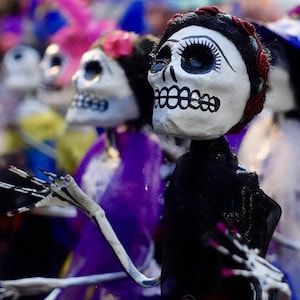 Day of the Dead has been an important celebration for so many of us for the last few years. I have felt grateful for the opportunity to share with this congregation this holiday during worship. And I know this is a meaningful service for so many of our Mexican, Mexican-American, and Latinx members. An affirmation of our culture and an opportunity to honor our beloved dead in community. The pandemic has already prevented us from gathering and celebrating so many occasions together: Easter, Pride, Pachamama, and more. For our services and some rituals, we have tried new virtual ways to recreate them. But, leading a Day of the Dead service online didn’t feel right to me this year. 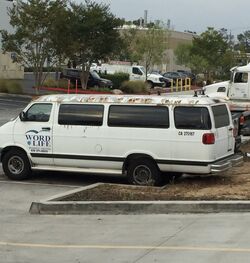 A typical delivery van that pantries use to pick up food. A typical delivery van that pantries use to pick up food. by Maureen McNair Food pantry volunteers Loren and Dana Tomlinson are moving to Arizona at the end of November. They own a huge Ford pick up truck and have been reliably and enormously generous with their time and energy picking up food for the pantry. In fact, they are the only congregant volunteers the pantry has who have ever picked up food in a truck for the pantry. The pantry needs transportation in place no later than November 27. If you, or someone you know, owns a pick up truck or delivery van, now is a great time to volunteer! Ballot Proposition Discussion by League of Women Voters & First Unitarian Universalist Church10/9/2020
Tuesday, October 13, 6 pm, Register here to get the link: http://bit.ly/LWVPropTalk. This year, we will be making decisions on 12 California ballot propositions and five more measures for San Diego city. Get the inside scoop on how to tackle your ballot this election season with the League of Women Voters & First Unitarian Universalist church.
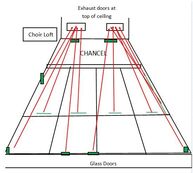 Volunteers Kate Collier and Laura Ball. Volunteers Kate Collier and Laura Ball. By Maureen McNair. Early food preparation last Friday for our Saturday food distribution went smoothly. Jared Blackwell, Kate Collier, Steve Gelb, Steve Howard, Andrea Travers, and I carried 3,350 pounds of food into the pantry and securely stored it. We even arranged the cantaloupes, potatoes, and apples in such a way that Saturday morning, we could create an easy assembly line to put the produce into bags. We worked hard, said our goodbyes, and went home. Then, my phone rang. It was a friend who operates a food pantry in San Ysidro. She was delivered 48 extra USDA boxes of perishable food, including eggs, cheese, meat, and a full gallon of milk. In total, it was nearly 1,600 pounds of food she could not distribute or store. “Can you take it?” She asked. 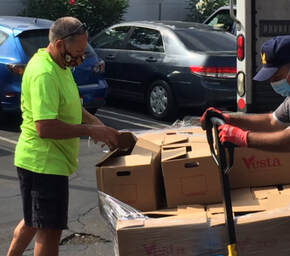 Loren Tomlinson helping unload combo boxes. Loren Tomlinson helping unload combo boxes. by Maureen McNair The combo box program arrives just as our food pantry clientele continues to explode. Last Saturday, we distributed food to 152 heads of household who waited in line while volunteers unloaded the delivery truck. The heads of household have families with a total of about 650 people for whom we provided food for meals for a few days. We received 132 combo boxes and distributed food to a total 152 households. So, one of the things I am working on this week is trying to obtain more boxes of food for October. 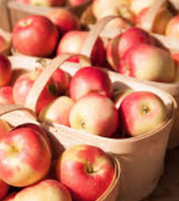 by Maureen McNair Recently, during the same week, two adults visiting our South Bay Food Pantry told me they had not eaten in three days and I received an offer for 11,000 pounds of free apples. We all understand that people in our community go without food because they don't have the money to buy it. And, we know that many more than two people in our region went hungry that particular week. The produce wholesaler offered me the apples for free, if I would take them all. The transportation was our responsibility. The apples were harvested in Washington State and transported in a refrigerated semi-truck to the produce wholesaler's warehouse near the San Ysidro border crossing. But, the wholesaler couldn't find buyers for the apples. They were perishable and took up valuable warehouse space. If he didn't give away the apples, the company would have to pay the costs to transport the food to a landfill and pay the fee to use the landfill. That was more cash out of the business' pocket toward an investment that had already lost money. So, it made financial sense for the produce wholesaler to make a tax-deductible gift of the 11,000 pounds of apples. 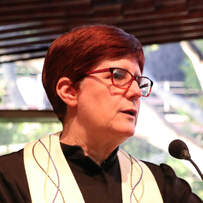 The fall is a favorite season of mine. I enjoy the changes fall brings: cooler weather, the turning of leaves, and the food of the season. This month will also bring the opportunity to practice living our values and principles, to learn about ballot initiatives and engage deeply in important questions about who we want to be and what direction we want our country to move in as we approach the November election. Our monthly worship theme of Reparations is timely. This topic is both straight forward and complex. This topic brings up all kinds of emotions and there's a lot to learn together. For me, one of the biggest values tied to the theme of Reparations is truth-telling- recognizing the fuller story of our country's history and how it continues to play out in our lives today. This theme asks us important questions that affect our future. I recommend this article for you to read: Floyd’s America — Introduction: The Post-Slavery State, Homicide, and the New Case for Reparations. 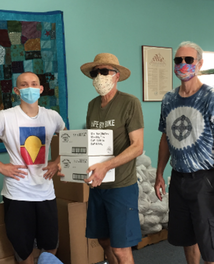 Jared Blackwell, Steve Gelb, and Steve Howard carrying about 3,000 pounds of food in 88 degree heat. Jared Blackwell, Steve Gelb, and Steve Howard carrying about 3,000 pounds of food in 88 degree heat. By Maureen McNair Four hundred years ago, in the first quarter of 2020, one of San Diego's two major food banks, Feeding San Diego, brought on our little pantry as a partner. They paired us with a Chula Vista grocery store. Several volunteers and I trained at Feeding San Diego (FSD) on how to pick up free food the grocery store would otherwise send to the landfill. FSD scheduled our first appointment to pick up free food. But, that week, as bad luck would have it, the governor closed the state because of the Corona virus. FSD canceled our appointment because there was no food. So, we never got food through this partnership. Feeding San Diego (FSD) then closed itself for two weeks to reorganize so it could support the increased demand for food from its existing pantry partners. I am sure many of you recall the food shortages and empty store shelves. FSD was very kind to our pantry, giving us thermometers for our refrigerators and freezers, a scale, a freezer blanket, and inviting me to online training. But, they also made it clear they would not be able to give us the one thing our pantry needed the most - food. That remains their official policy now - no food to new pantry partners. Until, one recent day, I received a gift by way of text. By Maureen McNair
Last week, Dana and Loren Tomlinson took their pickup truck on vacation, went boating on a lake, and left me to figure out food pick up and delivery for the pantry. The three of us have a good thing going. We plan what we are going to do to get food to the pantry, then we follow the plan. Since our pantry does not own a pickup truck or delivery van and I own a Prius, I called around to other pantries to see if anyone had an extra truck to deliver food for our Saturday morning distribution. Saturdays are busy food distribution days so I made lots of calls. Pantry friend Andre, who lives and works in Carlsbad, came through for us, and this is not the first time. Once, Andre decided our pantry needed another refrigerator. So, he gave us a used one, which he drove down from Carlsbad in the back of his pickup truck. When Andre arrived in our parking lot with the refrigerator, I noticed he did not bring portable ramps. Portable ramps are gadgets that allow a person to take an appliance strapped to a dolly and roll the appliance from the truck bed to the ground. "Did you bring portable ramps?" I asked Andre. "I have what I need," he said. Andre then reached into his pickup truck bed, wrapped his arms around the full sized refrigerator, lifted it to the ground, and carried it across our parking lot into what used to be the church social hall. I followed Andre carrying a reasonably-sized object - an iced latte. Need more examples of institutional racism & White privilege?
We are less than three months away from the General Election on November 3, 2020. All California voters will be sent a vote-by-mail ballot with prepaid postage for the General Election. To make sure that you get your ballot, double-check your voter registration at voterstatus.sos.ca.gov.
Tip of the Week: Planting a shade tree is a visible and affordable way to take local climate action. Trees absorb carbon, reduce water and air pollution, provide wildlife habitat and help cool the planet. Decades of inequitable investments in San Diego communities can be reduced by planting trees in neighborhoods that lack them. The Kate Sessions Commitment invites communities to plant 100 trees in their neighborhoods. Reserve your five-gallon tree today.
By Maureen McNair
Last Saturday morning, a woman I had never met drove over to my house and gave me $300 in cash. To be fair, I had spoken with her on the phone earlier in the day when she used her credit card to pay the fees for over a week at a county campground. Her altruism was on behalf of a homeless US Marine and his family who showed up at the South Bay Food Pantry earlier in the day. The Marine, David, with his two year old son in tow, found our pantry through 211 emergency services. One of our pantry volunteers gave David a standard bag of food we create for unsheltered guests. Saturday was a busy day. Our pantry has seen a 25% increase in clients over the last two weeks. Last Saturday when David showed up, we served 127 heads of household, representing about 570 people, in 90 minutes. I did not have a chance to get to know David until he came back later to give me his phone number. He had offered to volunteer. We have assembled a list of the best anti-racism articles, books, social media feeds and videos we know of to help people learn about a wide range of topics relating to racism. Please invest in yourself, your family, your community and our world by viewing and sharing these links and, more importantly, we hope you'll join us in taking the steps shared herein to begin to heal our world.
As Unitarian Universalists we must speak and act to stop the frequent, state-sanctioned violence committed against members of our shared community. The murders of Breonna Taylor in Kentucky, Ahmaud Arbery in Georgia, Tony McDade in Florida, and George Floyd in Minnesota, among so many others, were all committed by police or former police. Here in San Diego, we also see police brutality such as that perpetrated against an individual walking her dog on the beach as well as in La Mesa when a police officer had an altercation with a black man at a trolley station. This is not about a few rogue officers. This isn’t about the need for more training. This isn’t even about a change in leadership. Replacing one police chief with another is not enough if the pervasive racist system that empowers them is unchanged. The work of transforming our law enforcement and justice system into a true JUSTICE system will be long and difficult, messy and painful. We commit to that work, in solidarity with our partners. Violence against Black and Brown bodies, committed by officers of the law, demands this system must be remade.
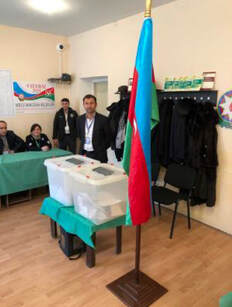 By Martin Kruming On a warm, sunny day in March, San Diegans went to the polls. After showing identification, they received their ballots, stepped into voting booths, made their choices, handed the ballots to poll workers, and hurried off to work, home, or elsewhere. Thousands of miles away, citizens of Azerbaijan, a former Soviet Republic surrounded by Russia, Iran and Turkey, showed up at polling stations on a cold, blustery day in February to choose members of the Azerbaijan Parliament. They showed IDs, took a ballot which they marked, returned it to the election officials, and stuck around to socialize with fellow voters. Two places-16 hours apart by plane-each trying to make democracy work during a very unsettling and confusing period in history. 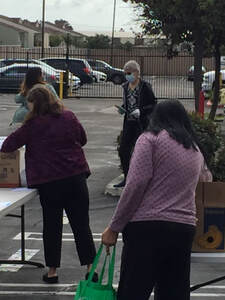 Sonya Prestman counts food pantry shoppers. Sonya Prestman counts food pantry shoppers. By Maureen McNair In June of 2019, four or five congregants attending the annual meeting in the Meeting House wrote down that their vision for the future of First UU included a food pantry or a soup kitchen. At the time, the primary concerns on the minds of most people at that meeting were things such as how we would respond to the offer from UCSD Medical Center to purchase our Hillcrest campus; whether we would expand our music, dance, and art programs; and, requests that we find more ways to enjoy meals together. I didn't believe those few requests to start a food pantry would make it into the top five goals of the new strategic plan the congregation was providing input for. But, those requests reflected such an acute and immediate need that, as a newly elected member of the Board of Trustees, I thought we should do something about them. The South Bay food pantry will be open every Saturday in May from 11 am - 12:30 pm.
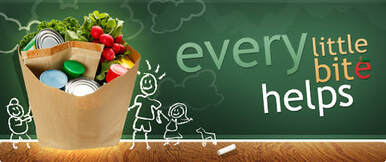 Hillcrest: bring your food donations to the Hillcrest parking lot every Saturday from 8am-9am. Deliver bags and boxes to the bed of Dana Tomlinson’s dark grey Ford pick-up truck with camper shell. South Bay: deliver donations directly to the food pantry from 9:30am - 10 am. Get directions to either location. Peanut butter is our most frequently requested food! We cannot buy it in bulk, so your individual donations of 1 or 2 jars makes a difference! Our other frequently requested items are:
Here are the top 8 jobs where the pantry could use more support.
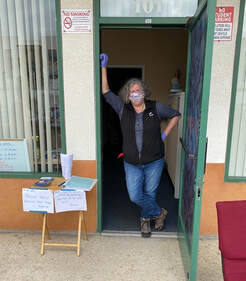 Bella Furth taking all precautions while on duty at the SB Food Pantry. Thank you Bella! Bella Furth taking all precautions while on duty at the SB Food Pantry. Thank you Bella! Both one-time and monthly sustaining donations help us stay open! No amount is too small, or too large. To donate by check: Make your check payable to FUUSD, write "SB Food Pantry" in the memo line and mail to to FUUSD, 4190 Front St., San Diego, CA 92101, Attn: Robie Evans. To donate by credit card: Go to firstuusandiego.org/donations.html. Follow the steps and under "Fund" select "SB Food Pantry." Remember to select the frequency for your donation. Photos by John and Peggy Holl. Click for a larger view. |
What's New?The First UU Church of San Diego blog is your resource for upcoming events and past event recaps. Leave us a comment to let us know what you think!
Categories
All
Archives
July 2024
|
(619) 298-9978 | Staff Directory
Hillcrest campus 4190 Front Street, San Diego, CA. 92103 | South Bay campus 970 Broadway, Chula Vista, CA. 91911
For GPS to our Hillcrest Campus, please use 298 W Arbor Dr., San Diego, CA 92103
For directions, parking and more see our Contact page.
Hillcrest campus 4190 Front Street, San Diego, CA. 92103 | South Bay campus 970 Broadway, Chula Vista, CA. 91911
For GPS to our Hillcrest Campus, please use 298 W Arbor Dr., San Diego, CA 92103
For directions, parking and more see our Contact page.
©First Unitarian Universalist Church of San Diego. All rights reserved. Admin.

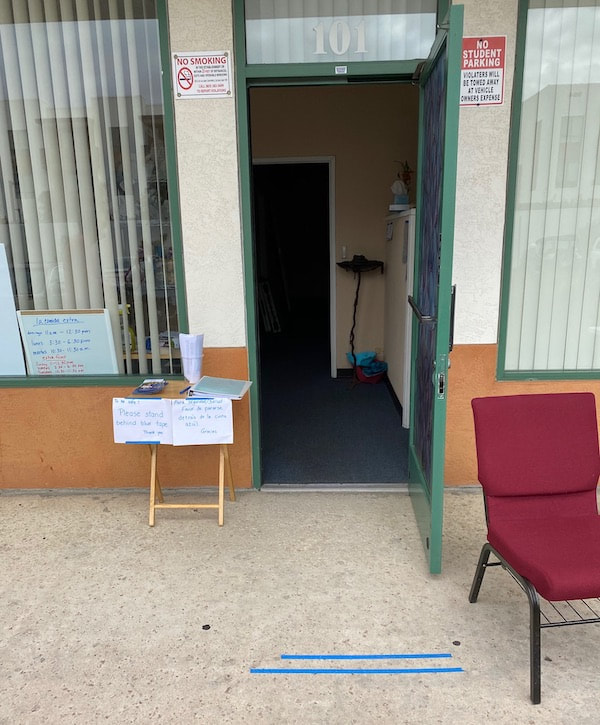
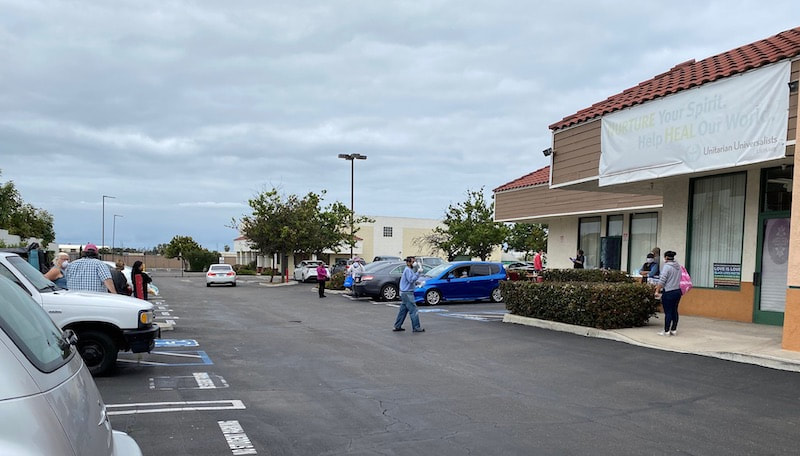
 RSS Feed
RSS Feed





